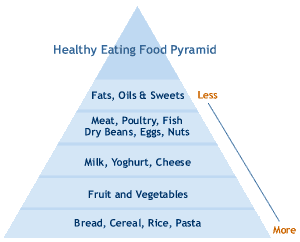| |
 In
Australia,as with most of the developed world, the incidence
of obesity in children continues to grow. Being overweight
is regarded by experts as a danger to an individuals health
throughout their life. In
Australia,as with most of the developed world, the incidence
of obesity in children continues to grow. Being overweight
is regarded by experts as a danger to an individuals health
throughout their life.
This increase in over weight children
may be attributed to a number of factors such as the larger
part fast foods take in many families' diet and that children
are generally not as physically active as in the past. If you feel your child
is a little overweight how can you help them?
Here are some supportive, even
fun, ways you can work together with your child to help
them have a balanced nutritional diet.
Support
your child to develop good attitudes about eating.
Children should never be placed on a restricted diet to lose weight, unless
a doctor supervises one for medical reasons. Limiting what children eat may
be harmful to their health and interfere with their normal growth and development.
To promote proper growth and development and prevent weight gain, parents should
offer the whole family a wide variety of foods from each of the food groups
displayed in the Healthy food Pyramid

If you are unsure what foods to provide
for your family consult a dietitian for nutrition counseling.
Reduce fat
Cut
down the amount of fat in your family's diet Reducing fat
is a good way to cut calories without depriving your child
of nutrients. Simple ways to cut the fat in your family's
diet include eating low fat or no fat dairy products, poultry
without skin and lean meats, and low fat or fat free breads
and cereals. Making small changes to the amount of fat
in your family's diet is a good way to prevent excess weight
gain in children.
If you are going to change your child's diet, please obtain professional advice
before going ahead, as children require supervision by a health professional
or dietitian. In addition fat should not be restricted in the diets of children
younger than 2 years of age. After that age, children should gradually adopt
a diet that contains no more than 30% of calories from fat by the time the
child is about 5 years old.
It is important to be aware of the fat,
salt, and sugar content of foods in which you may serve
to your family.
Try not to be over restrictive on snack foods, [your dietitian will advise
you in this area] as snack foods that are high in sugar, salt and fats do have
a place in the diet in moderation.
More Tips
- Make a wide variety of healthy foods
available in the house. This will encourage children
to make healthy food choices
- Encourage
your child/ren to eat slowly. A child can detect hunger
and fullness better when eating slowly
- As a family
try and eat your meals together, making mealtimes a pleasant
and enjoyable experience. Meal times should not be a
time for scolding or arguing. If mealtimes are unpleasant,
children may try to eat faster in order to leave the
table in hurry. They then may learn to associate eating
with stress
- Most children
will like to be involved in food shopping and meal preparation,
which provides you with an opportunity to teach your
child about nutrition and a feeling of accomplishment.
In addition, children may be more willing to eat or try
foods that they have helped to prepare
- Continuous
snacking may lead to overeating, try and plan snacks
at specific times during the day, as they can be part
of a nutritious diet, without spoiling a child's appetite
at meal times. Try and gather ideas on nutritious snacks,
without depriving your child of occasional chips and
lollies, especially at parties or other social events
- Try not to
make your child look different in front of their friends
where their diet is concerned
- Together with your child make a list out of healthy
snacks and display it on the fridge/notice board.
Rewarding or punishing with food.
Try not to use food to punish or reward
your child. Withholding food as a punishment may lead children
to worry that they will not get enough food. For example
sending children to bed without any dinner may cause them
to worry that they will go hungry. As a result, children
may try to eat whenever they get a chance. Similarly, when
foods, such as, lollies/ chips are used as a reward, children
may assume that these foods are better or more valuable
than other foods. For example telling children that they
will get desert if they eat up all their vegetables sends
a wrong message about vegetables.
To ensure your child's meals outside of the home are balanced try to find out
more about your child's school canteen. Do they offer healthy lunches or have
a variety of foods from which to choose? Pack your child's lunch to include
a variety of foods. When eating out select healthy foods from the menu.
Being a good role model.
Children learn from adults, setting a
good example to your children by eating a variety of healthy
foods as well as being physically active will teach your
children healthy lifestyle habits that they can follow
for the rest of their lives.

|

